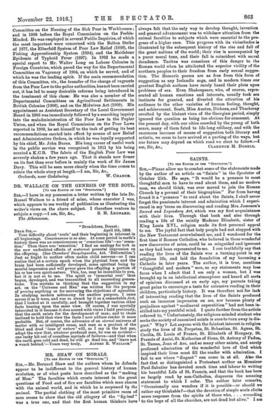MR. SHAW ON MORALS.
[To THE EDITOR OF THE "SPECTATOR."]
Sin,—Mr. Bernard Shaw and the authors whom he defends appear to be indifferent to the general history of human evolution, or of what poets have described as the "making of Man." The faculties which create interest in the great questions of Food and of Sex are faculties which man shares with the animal world, and in which he is surpassed by the animal. The partial clothing of the most primitive races of men seems to show that the old allegory of the " fig-leaf " was a true one, and that the first human thinkers have
always felt that the only way to develop thought, invention and general advancement was to withduaw attention from the animal faculties to subjects which were essential to the pro- gress of a higher race. This progress with it vicissitudes is illustrated by the subsequent history of the rise and fall of the great nations of the world ; their rise is accompanied by a purer moral tone, and their fall is coincident with moral decadence. Tacitus was conscious of this danger to the Roman world when he attributed the superior virility of the northern peoples to their freedom from early sexual sugges- tion. The Homeric poems are as free from this form of suggestion as any Icelandic saga, and in modern times our greatest English authors have rarely based their plots upon problems of sex. Even Shakespeare, who, of course, repre- sented all human emotions and interests, usually took sex instincts for granted, and diverted the attention of his audience to the other varieties of human feeling, thought, and achievement. Scott, Miss Austen, Dickens, and Thackeray revolted by the blatant vices of the Georgian period, simply ignored the question as being too obvious for comment. At the present day, with our cities crowded by the young of both sexes, many of them fated to life-long celibacy, and with the enormous increase of means of suggestion both literary and artistic, we seem to have arrived at a parting of the ways, but our future may depend on which road we elect to follow.—I


















































 Previous page
Previous page